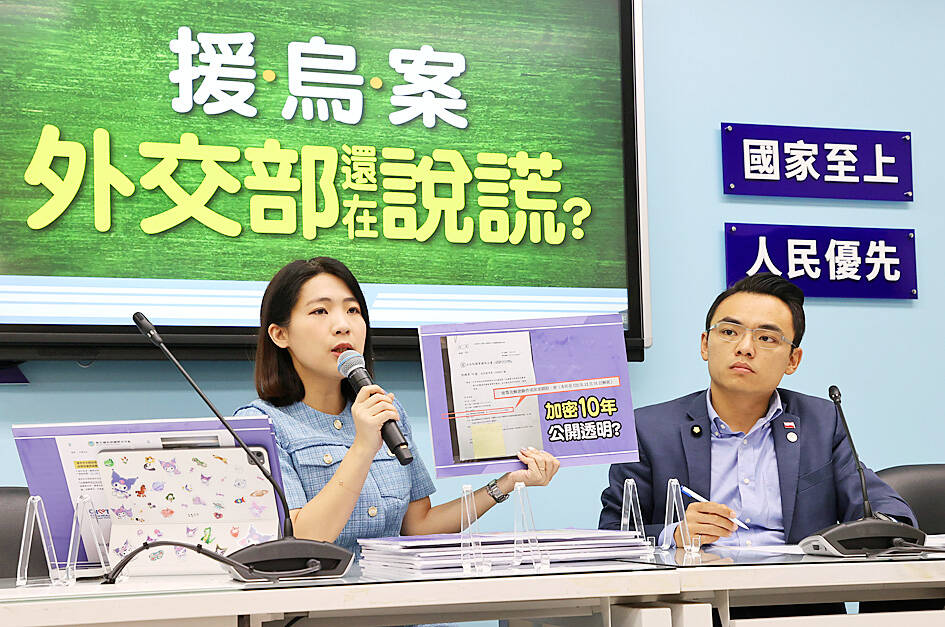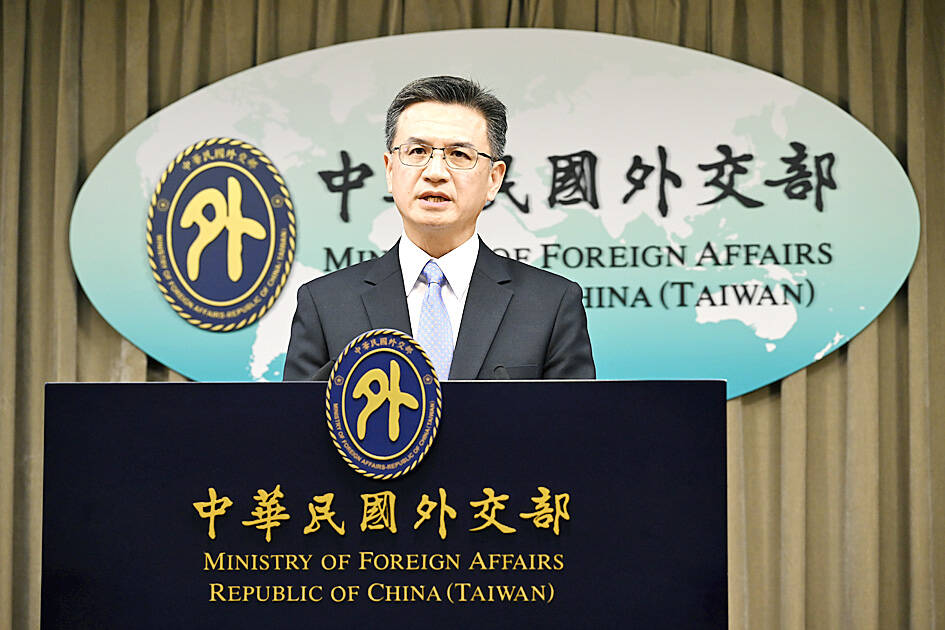Premier Chen Chien-jen (陳建仁) and the Ministry of Foreign Affairs yesterday denounced Chinese Nationalist Party (KMT) Legislator Hsu Chiao-hsin (徐巧芯) for making false allegations about donations to Ukraine and disclosing confidential documents, with the ministry saying that it would take legal action.
The ministry last year signed an agreement with the Czech Republic on a healthcare project to assist Ukraine, which is to be carried out by the Czech Health Technology Institute.
Hsu accused the ministry of being indirectly involved in the party politics of the Czech Republic as institute chairman Petr Foit is a local medical supplier, and has close political and business relations with members of parliament.

Photo: CNA
Taiwan has no official relationship with Ukraine so the majority of projects to assist Ukraine are carried out jointly with its neighboring nations, such as the Czech Republic, Poland, Lithuania and Slovakia, ministry spokesman Jeff Liu (劉永健) told a news conference yesterday.
Central and eastern European nations are more experienced in assisting Ukraine and can communicate with Ukrainian officials directly, he said, adding that the cooperation also strengthens Taiwan’s ties with these nations.
The Czech government has taken cooperation with Taiwan seriously, sending its envoy for the reconstruction of Ukraine to Taiwan to sign the cooperative agreement in person, he said.

Photo: Lo Pei-de, Taipei Times
The agreement was classified given Taiwan’s unique diplomatic situation — cooperation between Taiwan and like-minded nations is often obstructed or undermined, he said.
However, relevant documents were all sent to the Legislative Yuan for review in accordance with legal procedures and can be accessed by legislators, he added.
Legislators can ask for the ministry’s clarification if they have questions about the documents, but they cannot disclose confidential documents to the media, he said.
Hsu on Sunday showed the agreement between Taipei and Prague to the media, using sticky notes to conceal parts of its content.
Asked about the basis of her allegation, Hsu told reporters she “heard about it.”
Liu said Hsu “completely ignored the protection of state secrets.”
Hsu on Sunday said that the information she disclosed had already been made public by the ministry, adding that she was supervising the government to prevent it from taking advantage of secretive agreements to spend money recklessly.
Chen yesterday said that as Taiwan is facing a difficult diplomatic situation, some diplomatic efforts are submitted to the legislature as confidential documents to prevent disruption by malicious third parties.
Hsu’s actions were “very harmful” to Taiwan’s diplomatic efforts and the defense of its sovereignty, he said.
Taiwan should cherish its friendship with other nations such as the US, Japan, the Czech Republic and Lithuania, all of which are willing to support Taiwan, Minister of Foreign Affairs Joseph Wu (吳釗燮) said yesterday.
Democratic Progressive Party Legislator Hung Sun-han (洪申翰) said the documents Hsu showed were received by all 113 legislators, which demonstrated the openness and honesty of the project.
Disclosing the details of the cooperative project is a contravention of Article 132 of the Criminal Code, which stipulates that a public official who discloses secret information relating to matters other than national defense could face up to three years in prison, Hung said.
Additional reporting by Lin Hsin-han

Intelligence agents have recorded 510,000 instances of “controversial information” being spread online by the Chinese Communist Party (CCP) so far this year, the National Security Bureau (NSB) said in a report yesterday, as it warned of artificial intelligence (AI) being employed to generate destabilizing misinformation. The bureau submitted a written report to the Legislative Yuan in preparation for National Security Bureau Director-General Tsai Ming-yen’s (蔡明彥) appearance before the Foreign Affairs and National Defense Committee today. The CCP has been using cognitive warfare to divide Taiwanese society by commenting on controversial issues such as Taiwan Semiconductor Manufacturing Co’s (TSMC, 台積電) investments in the

HELPING HAND: The steering committee of the National Stabilization Fund is expected to hold a meeting to discuss how and when to utilize the fund to help buffer the sell-off The TAIEX plunged 2,065.87 points, or 9.7 percent, to close at 19,232.35 yesterday, the highest single-day percentage loss on record, as investors braced for US President Donald Trump’s tariffs after an extended holiday weekend. Amid the pessimistic atmosphere, 945 listed companies led by large-cap stocks — including Taiwan Semiconductor Manufacturing Co (TSMC, 台積電), Hon Hai Precision Industry Co (鴻海精密) and Largan Precision Co (大立光) — fell by the daily maximum of 10 percent at the close, Taiwan Stock Exchange data showed. The number of listed companies ending limit-down set a new record, the exchange said. The TAIEX plunged by daily maxiumu in just

‘COMPREHENSIVE PLAN’: Lin Chia-lung said that the government was ready to talk about a variety of issues, including investment in and purchases from the US The National Stabilization Fund (NSF) yesterday announced that it would step in to staunch stock market losses for the ninth time in the nation’s history. An NSF board meeting, originally scheduled for Monday next week, was moved to yesterday after stocks plummeted in the wake of US President Donald Trump’s announcement of 32 percent tariffs on Taiwan on Wednesday last week. Board members voted to support the stock market with the NT$500 billion (US$15.15 billion) fund, with injections of funds to begin as soon as today. The NSF in 2000 injected NT$120 billion to stabilize stocks, the most ever. The lowest amount it

INVESTIGATION: The case is the latest instance of a DPP figure being implicated in an espionage network accused of allegedly leaking information to Chinese intelligence Democratic Progressive Party (DPP) member Ho Jen-chieh (何仁傑) was detained and held incommunicado yesterday on suspicion of spying for China during his tenure as assistant to then-minister of foreign affairs Joseph Wu (吳釗燮). The Taipei District Prosecutors’ Office said Ho was implicated during its investigation into alleged spying activities by former Presidential Office consultant Wu Shang-yu (吳尚雨). Prosecutors said there is reason to believe Ho breached the National Security Act (國家安全法) by leaking classified Ministry of Foreign Affairs information to Chinese intelligence. Following interrogation, prosecutors petitioned the Taipei District Court to detain Ho, citing concerns over potential collusion or tampering of evidence. The